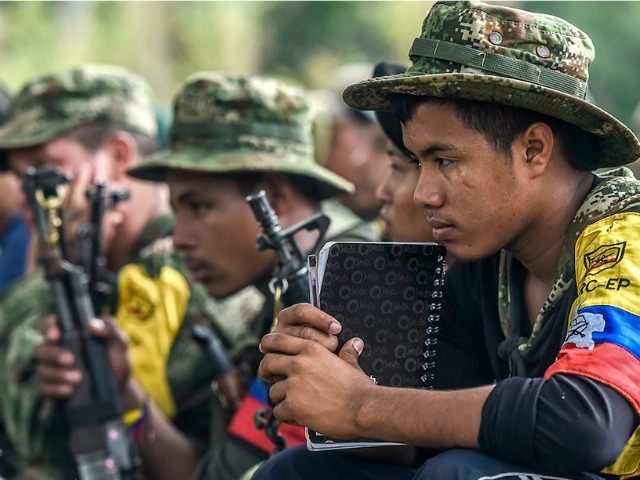The Colombian government announced Wednesday that it had approved for an amnesty and rehabilitation program four members of the Marxist terror organization FARC, the beginning of the implementation of a peace deal expected to allow 4,500 terrorists to reintegrate into society.
The peace deal between the government of President Juan Manuel Santos and the Revolutionary Armed Forces of Colombia (FARC), while winning Santos a Nobel Peace Prize, proved unpopular enough among Colombians to lose a popular referendum vote in October 2016. The government chose to override the referendum and impose the peace deal as constitutional legislation last year.
The office of the nation’s prosecutor general announced on Wednesday that it had begun processing applications from FARC terrorists who had handed over their weapons to the government and sought to be processed and reintegrated into Colombian society. The office added that it had received 98 applications for amnesty between February 23 and March 1 and approved four of them. The statement did not identify the four terrorists or their crimes.
FARC leaders estimate that 6,900 terrorists have congregated around 26 predetermined “demobilization” centers to hand over their weapons and undergo the amnesty process. Many who have congregated in some of the most rural FARC strongholds have protested to media outlets that the government does not appear organized enough to process them all, and they fear for their lives should they hand over their weapons and attempt to return to civilian life. Due to the FARC’s policy of mass kidnapping of rural children, many FARC terrorists were once hostages who later became child soldiers and, ultimately, fully integrated members of the FARC.
Among them is Maritza González, who spoke to the Agence France-Presse. González told the outlet that she had joined the FARC when she was 14 and held onto hope that the peace process would succeed but feared the government would back out after she had handed over her weapons.
The Christian Science Monitor found numerous disgruntled FARC terrorists reconsidering handing over their weapons due to the lack of an efficient bureaucracy to process them all. Not all have kept their patience. “Rival armed groups, such as the criminalized paramilitary network known as the Urabeños, are recruiting battle-hardened ex-FARC fighters to strengthen their ranks, according to authorities,” the outlet notes.
The Monitor also highlights an alarming quote from Colombia’s High Commissioner for Peace Sergio Jaramillo: “No government has ever faced such a logistical challenge. How do you do this? Who has the logistical capacity to construct [26 camps]?”
President Santos himself has kept up optimistic appearances, posting multiple messages on Twitter promoting tourism to Colombia. “There has never been a better moment than today to promote tourism,” he wrote. “We are on the list of best destinations in the world.”
In another message, he wrote: “peace is the best ally, the best promotor of tourism!”
“Between 2010 and 2016, tourism rose nearly 3,000% in conflict zones,” he wrote in another message.
The leaders of the FARC terrorist group also appear optimistic. “The FARC are not involved in dilatory tactics in the process, and are conscious that we must give the government time to fulfill its promises,” spokesman “Ivan Márquez” told reporters. Local FARC chief “Rubén Zamora” told the Bogotá-based newspaper El Tiempo that the 562 fighters under his control in the Mesetas demobilization zone had handed over their weapons and that these were ready to be handed over to the government.
The FARC have much to gain from this peace deal as it may one day allow them to evolve from a terrorist organization into a Hezbollah-style narco-terrorist political party. A special tribunal will process all those surrendering their weapons and amnesty will consist of being forced into community service projects and a program to help reintegrate them into civilian life for those found guilty of “political crimes.” Those found guilty of “crimes against humanity” will have to serve prison time, though the government has not clarified what sorts of crimes fall into each category. The FARC regularly engages in drug trafficking, kidnapping for ransom, forced abortions, rape, murder, and the use of child soldiers.
The deal currently in place was slightly modified after the humiliating defeat the government suffered in October when rural voters with personal experience with FARC terrorism turned out to vote against the deal. This new deal is 300 pages long and includes language about “gender equality” as well as a demand that the FARC generate an “inventory” of its assets for the government to see. There is no indication they will not be able to use these assets, much of their value generated from illegal activity, to influence politics.

COMMENTS
Please let us know if you're having issues with commenting.